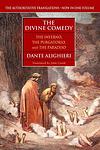Dante Alighieri
Dante Alighieri, commonly known as Dante, was a major Italian poet of the Middle Ages. His Divine Comedy, originally called Comedìa and later christened Divina by Giovanni Boccaccio, is widely considered the greatest literary work composed in the Italian language and a masterpiece of world literature. He is often referred to as the 'Father of the Italian language', and he played a crucial role in the development of the Italian language and literature. Dante's work is also notable for its encyclopedic nature and its exploration of the human condition, combining personal experience with a universal quest for knowledge and understanding.
Books
This list of books are ONLY the books that have been ranked on the lists that are aggregated on this site. This is not a comprehensive list of all books by this author.
-
1. The Divine Comedy
In this epic poem, the protagonist embarks on an extraordinary journey through Hell (Inferno), Purgatory (Purgatorio), and Paradise (Paradiso). Guided by the ancient Roman poet Virgil and his beloved Beatrice, he encounters various historical and mythological figures in each realm, witnessing the eternal consequences of earthly sins and virtues. The journey serves as an allegory for the soul's progression towards God, offering profound insights into the nature of good and evil, free will, and divine justice.
-
2. The Inferno
The book is an epic poem that takes the reader on a profound journey through the nine circles of Hell, guided by the ancient Roman poet Virgil. The narrative follows the author's alter ego as he embarks on a quest for salvation, encountering the souls of the damned and witnessing the divine justice meted out for their earthly sins. The vivid and often harrowing depictions of the torments suffered by the inhabitants of the underworld serve as an allegory for the spiritual trials that individuals must overcome. This journey is not only a personal one but also represents the soul's path towards God, exploring themes of morality, redemption, and the nature of sin.
-
3. The New Life
"The New Life" is a prose work that combines both poetry and an autobiographical narrative to explore the themes of love and spiritual longing. The text recounts the author's intense love for a woman named Beatrice, whom he first sees at a young age and becomes enamored with, despite their minimal interaction. Her sudden death plunges him into a state of grief and prompts a profound journey of philosophical and theological inquiry. The work is a meditation on the nature of love, its connection to the divine, and the transformative power it holds. Through a series of poems and reflective prose passages, the author examines the impact of this idealized and unattainable love on his life and work, ultimately finding a new understanding of the relationship between earthly passion and eternal life.


